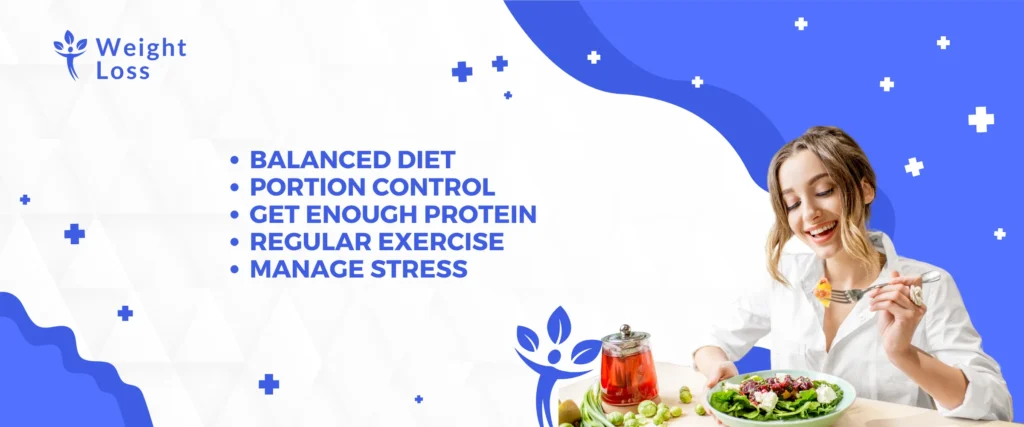
For Weight loss here are some evidence-based tips to help you get started
Balanced Diet is the key
Focus on unprocessed foods like fruits, vegetables, lean proteins, healthy fats and whole grains. Limit processed foods, Avoid sugary drinks, fast food, processed snacks,sodium and unhealthy fats. Aim for a variety of foods and include all food groups.
Portion Control:
Be mindful of portion sizes to avoid overeating.Use smaller plates and bowls to control the amount of food you eat.
Eat slowly and savor your food:
This can help you feel full and satisfied, reducing the likelihood of overeating.
Get enough protein:
Maintaining your weight loss strategy can be made easier by eating protein, which can help you feel satisfied and full. For every pound of body weight, aim for 0.8–1 grams of protein each day.
Stay Hydrated:
Drink plenty of water throughout the day to help control hunger and boost metabolism. Hydration keeps the body functioning well. Sometimes thirst can be mistaken for hunger.
Regular Exercise:
Incorporate both cardio and strength training exercises into your routine to burn calories and build muscle.
Incorporate strength training can help boost your metabolism and support weight loss. Remember regular exercise is so important for maintaining both physical and mental well-being.
Whether it’s going for a run, hitting the gym, practicing yoga, or even just taking a brisk walk, staying active has numerous benefits. Aim for at least 150 minutes of moderate-intensity aerobic exercise, or 75 minutes of vigorous-intensity aerobic exercise, or a combination of both, per week.
Include strength training, high-intensity interval training (HIIT), and other forms of physical activity to help you burn calories and build muscle.
Weight loss takes time and effort
Focus on making sustainable lifestyle changes that you can maintain in the long term, rather than trying fad diets or quick fixes. Therefore, Make small, sustainable changes rather than drastic ones. Consistency & patience is key for long-term success.
Get Enough Sleep :
Lack of sleep can affect metabolism and appetite hormones, making weight loss more difficult. Getting enough sleep is crucial for your overall health and well-being. It helps your body and mind recover, improves cognitive function, and boosts your immune system. Aim for 7-9 hours of sleep per night to help regulate hunger hormones and support weight loss.
Manage Stress :
Chronic stress can lead to overeating and weight gain. Practice stress-reducing activities like yoga, meditation, or spending time outdoors.Seek Support: Surround yourself with supportive friends, family, or a community to help you stay motivated and accountable.
Monitoring your progress is an essential part of any weight loss journey
Keep track of your food intake, measurements, physical activity, and weight loss progress using a food diary or a mobile app. How your clothes fit can help you stay motivated and make adjustments to your plan as needed.
Keep track of your calorie intake & monitor your daily calorie consumption as well. Aim for a deficit of 500-1000 calories to promote weight loss. There needs to be a way to monitor your weight loss progress.
Seek support:
Share your weight loss goals with a friend or family member and consider joining a weight loss support group for motivation and accountability.
Use of hot water for weight loosing:
Drinking hot water can have some potential benefits for weight loss.
Here’s how it might help: Promotes Digestion: Drinking hot water can help stimulate digestion, which may aid in better absorption of nutrients and elimination of waste. Curbs Appetite: Drinking hot water can help you feel full, potentially reducing your overall calorie intake if you consume it before meals. Boosts Metabolism: Some studies suggest that drinking hot water may temporarily increase metabolism, although the effect is modest.
Remember, weight loss takes time, patience, and dedication. Focus on making sustainable lifestyle changes that promote overall health and well-being, rather than quick fixes or fad diets. it’s important to consult with a healthcare professional before starting any new diet or exercise program, especially if you have any underlying health conditions. They can help you create a personalized weight loss plan that’s safe and effective for you.

